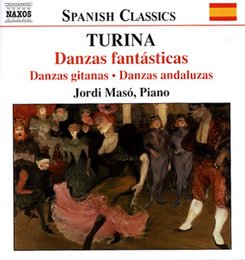| All Artists: Joaquin Turina, Jordi Masó Title: Turina: Danza fantásticas Members Wishing: 0 Total Copies: 0 Label: Naxos Release Date: 1/18/2005 Genres: Dance & Electronic, Classical Styles: Chamber Music, Forms & Genres, Suites, Historical Periods, Classical (c.1770-1830), Modern, 20th, & 21st Century Number of Discs: 1 SwapaCD Credits: 1 UPC: 747313215027 |
Search - Joaquin Turina, Jordi Masó :: Turina: Danza fantásticas
 | Joaquin Turina, Jordi Masó Turina: Danza fantásticas Genres: Dance & Electronic, Classical
|
Larger Image |
CD Details |
CD ReviewsˇOle! J Scott Morrison | Middlebury VT, USA | 02/19/2005 (5 out of 5 stars) "A dutiful son, Joaquin Turina (1882-1949) began to study medicine but he soon abandoned everything that interfered with music. Thank goodness! It has been customary to regard early 20th-century Spanish music as centered on two pairs of composers: Albéniz and Granados, Falla and Turina. However, any resemblance between the latter two is superficial. Nor is there much of Albéniz in Turina, although some of his works have a relationship with the style of Granados. Despite the picturesque local flavor in some compositions, Turina tried perhaps harder than any of his Spanish contemporaries to write music of a European standard in the conventional major forms. Turina was the only one of the four leading twentieth-century Spaniards to write a symphony. However, when it came to his piano music, or at least much of it, the Spanish flavor was inescapable. He was himself a wonderful pianist, having studied in Paris with Moritz Moszkowski, and his piano music is virtuosic. His music, like Falla's, partakes a bit more of Impressionist gestures. Still, it is colored by a subtle humor, grace and elegance characteristic of his native Seville.
On this disc pianist Jordi Masó plays works based on dance Spanish and/or Gypsy rhythms. Probably Turina's best known works are the 'Danzas fantásticas,' Op. 22. That is partly because he also orchestrated them brilliantly and they have featured on many symphony programs. My own favorite, perhaps of all of his music, is the hypnotic and lovely 'Ensueño' ('Fantasy'), the second of that set. Masó plays it very well, but I will confess that I prefer the orchestral version and for that very much like the recording made by Jesús López Cobos with the Cincinnati SO. Of piano versions, Masó's is as good as any I've heard. 'Three Andalusian Dances' are early pieces, written while he was still in Paris, but it is clear that Turina already had developed his own personal style. I particularly like Masó's performance of the third, 'Zapateado.' There are two sets of 'Gypsy Dances' ('Danzas gitanas'), Opp. 55 and 84, ten characteristic pieces. Particularly effective, for me, are Masó's interpretations of the mysterious (and almost French-sounding) 'Invocación' and the piece that follows it, the lightning-fast 'Danza ritmica' ('Rhythmic Dance') that is over almost before it begins. Following are the rarely heard 'Dos Danzas sobre temas populares españoles' ('Two dances on traditional Spanish themes'), Op. 41. I say they're rarely heard; I suppose what I mean is that I don't recall ever hearing them before. The first, 'Cadena de sequidillas' ('Chain of Sequidillas') is based on Andalusian melodies. The second, 'El arból de Guernica' ('The Tree of Guernica') is based on a Basque dance, the 'zorzico,' and is in 5/8 time. (The piece has nothing to do with Picasso's famous anti-war painting 'Guernica'; it was composed 11 years before the painting was done for the 1937 World's Fair.) The final work is 'Bailete: Suite de danzas del siglo XIX' ('Dance: Suite of nineteenth-century dances'), Op. 79. It was dedicated to Joaquin Nin y Castellanos, a Cuban composer who was the father, as it happens, of feminist writer Anaïs Nin and of one of my favorite 'unknown' composers, the Cuban-American Joaquin Nin-Culmell, who died precisely a year ago at 95. It comprises five traditional 19th-century dances--Entrada, Tirana, Bolero, Danza de corte, and Fandango. This is a brilliant suite, one I'd never heard before, and the highlight of the disc for me. If you love Spanish piano music--and who doesn't?--and don't know Turina this is a good place to start. It is budget-priced, the piano is beautifully recorded and Masó plays very nicely. There is a notation that it is 'Volume 1.' Chances are you'll get hooked by this one and have to buy each new issue as it comes out. TT=70:27 Scott Morrison" |

 Track Listings (23) - Disc #1
Track Listings (23) - Disc #1